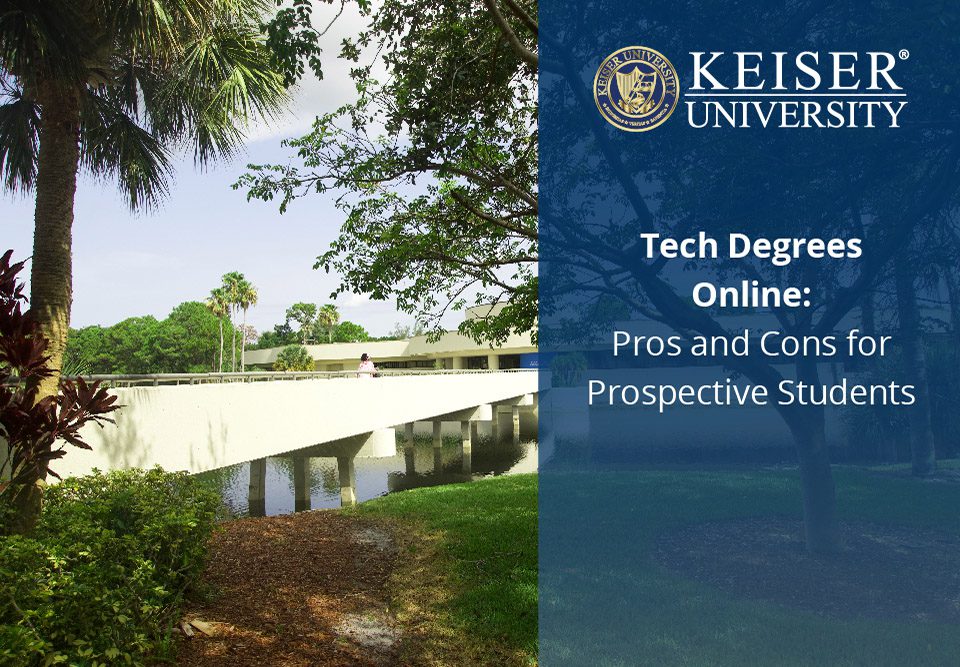Online education could be your ticket to career advancement and a personal sense of accomplishment. This is your chance to upskill and uncover new career possibilities. Promising unmatched convenience and flexibility, along with engaging learning experiences that mimic the best in-person college coursework, online learning helps you overcome educational and professional challenges as you invest in yourself.
Any online degree program can be valuable if it aligns with your professional goals, but the advantages of studying online take a definite step up when pursuing a tech-focused degree. Whether studying information technology, information security or even financial technology, you will gain confidence as you discover the nuances of the modern digital landscape. There is much to gain from pursuing a technology degree online, as we will reveal below:
What Are Online Tech Degrees?
Online tech degree programs offer the chance to earn a bachelor’s or master’s degree without needing to attend classes in person. These online degrees focus on tech-driven courses and platforms, emphasizing advanced technology not only as a field of study, but also, as a mechanism for delivering impactful learning materials and experiences.
Growth of Online Education in Technology Fields
Online education is thriving across many fields of study, with students from diverse backgrounds relying on digital platforms to expand access. This is especially appealing to working students, who, through online access, can embrace flexible scheduling and maintain a sense of stability in their everyday lives. Tech-driven professionals, for example, enjoy navigating online learning platforms and are eager to apply the takeaways from these programs and experiences in their own lives.
Who Should Consider an Online Tech Degree?
There is no one ideal candidate for pursuing an IT degree online, although top students tend to share a few key qualities:
- A willingness to embrace new technologies, not only as part of the core curriculum, but also, to access learning materials in the first place.
- Strong organization and time management skills, which can help overcome potential challenges such as the temptation to procrastinate.
- A reliable online learning setup, complete with a solid internet connection and a computer or laptop powerful enough to handle advanced programs or applications.
The Pros of Earning a Tech Degree Online
Pursuing an IT degree online can be deeply rewarding. This opens the door to fascinating coursework and provides the chance to gain tech-focused skills in high demand across many fields. Today’s advanced online learning platforms make this process easy and downright enjoyable to navigate. Advantages worth considering include:
Flexibility and Convenience
One of the most noteworthy reasons for pursuing an online degree? The need for flexibility, which can be difficult to achieve with traditional, on-campus programs. From asynchronous classes to accessible learning materials, online programs go above and beyond to ensure that all students can learn as they see fit. This flexibility may make degree programs feel more realistic for busy working students, who may need extra accommodations to juggle their packed schedules and make time for studying.
Accessibility for a Broader Audience
At one time, grad students were largely limited to in-person programs, which forced many to relocate and limited others to a narrow range of nearby colleges or universities. This was especially problematic for working students, who lacked the ability or willingness to uproot to pursue graduate degrees.
However, this is no longer necessary as online programs are accessible to students who live and work thousands of miles from their university of choice. Through the power of online platforms, these ambitious learners can connect with inspiring faculty members and fellow students, all while continuing to live and work where (and how) they desire.
Cost Savings and Affordability
Online tech programs offer a cost-effective approach to learning and can deliver an impressive return on investment. While some students may need to upgrade their internet or their digital devices, nearly every other financial aspect of the online experience can deliver significant savings.
The tuition itself may be more affordable than in-person classes, as online programs can limit overhead costs and pass the savings on to students. Additional savings can be secured by using virtual learning materials and especially by limiting practical expenses such as student housing or gas for commuting.
Ability to Continue Working While Studying
The financial components of a tech degree extend beyond tuition and commuting. Also worth considering is the ability to continue working while enrolled. This is technically possible with in-person programs but often proves more difficult, as classes and work schedules may come into direct conflict. The flexibility of an online program allows students to strike a balance between work, school and everyday life.
Self-Paced and Asynchronous Learning Options
Online programs offer many strategies for learning, with classes utilizing one of two main formats: synchronous or asynchronous.
Synchronous classes take place in real time and offer some advantages, including the ability to engage directly with both instructors and fellow students. For many students, however, the real appeal of online learning comes from asynchronous courses, which allow for self-paced learning and enhance the already flexible appeal of the online format.
Exposure to Digital Learning Tools and Platforms
Learning management systems (LMS) such as Blackboard Learn offer not only an easy way to access class resources, but also the chance to practice communicating and collaborating in an online environment. This exposure can be helpful, as it helps develop confidence in navigating curated online spaces. This ability translates well to the modern workforce, where tech professionals may be expected to leverage technical skills while navigating similar online platforms.
The Cons of Earning a Tech Degree Online
The advantages described above may seem compelling, but there are a few caveats that must be considered before pursuing a technology degree online. Some students can easily overcome the core challenges of online learning. Still, for others, these may be significant enough to make traditional, in-person coursework (or hybrid programs) more appealing.
Lack of Hands-On Lab Experience
Today’s advanced learning technologies promise immersive experiences that promote rapid skill development. Still, some students prefer the unique dynamics of in-person learning, where tangible equipment and materials can be explored in a structured and highly supportive manner. While advanced technologies can mimic the most engaging classroom experiences, they may not entirely replicate the dynamics of the in-person environment.
Limited Networking Opportunities
With in-person classes, every campus visit can easily double as a networking experience. In this unique environment, networking feels natural. It simply involves getting to know fellow students through everyday exposure and casual conversations and deepening these connections through study groups or campus events. Online programs offer networking opportunities, but these must be more intentional. Online students need to take a more active approach to building and sustaining professional networks.
Self-Discipline and Time Management Challenges
The most successful online learners are self-starters. These students do not need extra accountability. They can stay motivated while using trusted time management strategies to remain on track through each term or semester. Some students find this difficult and may benefit from the in-person guidance only a campus-based program can provide.
Potential Employer Perceptions of Online Degrees
At one time, some employers cast doubt on “non-traditional” programs such as online degrees. This perception has largely changed, with employers recognizing that students trained in both online and traditional programs can carry a robust skill set and a commitment to continuous improvement.
Employers are eager to capitalize on the unique strengths offered by online program graduates, including the ability to communicate and collaborate effectively using online platforms. Still, some students worry that their degrees will not be as positively perceived as credentials from traditional, campus-based programs.
Technical Requirements and Learning Curve
Some online platforms and experiences can produce a distinct learning curve, particularly for those with limited experience completing coursework online. Intuitive learning management systems like Blackboard Learning reduce confusion, but it may take time to fully understand their functions and maximize their resources for better learning outcomes.
Variability in Program Quality and Accreditation
Quality can vary dramatically from one online program to the next, and while this is arguably also true of on-campus programs, students focusing on nearby colleges may better understand which on-campus options are the most reputable. This can sometimes be difficult to assess when examining online programs. Thankfully, accrediting bodies provide valuable insight into program quality.
How to Decide If an Online Tech Degree Is Right for You
Still not sure if you are a solid candidate for pursuing an IT degree online? A little self-reflection can go a long way. Follow these steps to determine how and whether an online tech degree fits into your academic and professional plans:
Evaluating Your Learning Style
Every student learns differently, and some may naturally be drawn to the unique learning environments made available through advanced online platforms. Consider how you learn best and which resources you might need to navigate your grad school journey, regardless of where or how you take classes. For example, if you are a visual learner, well-designed online course materials may prove most appealing. That said, if you learn best through active, problem-solving experiences, in-person opportunities may be preferable.
Researching Program Accreditation and Reputation
No matter your preferred learning format, you want to feel confident that your potential program is well-regarded. This is best confirmed through program accreditation, which confirms that degree programs are capable of meeting rigorous academic standards. Keiser University, for example, is accredited by the Southern Association of Colleges and Schools Commission on Colleges (SACSCOC).
Comparing Online and In-Person Tech Degrees
While we have provided detailed insights into the differences between online and in-person programs, these may play out unexpectedly when examining college-specific degrees. Many colleges offer the same degree in multiple formats but may slightly adjust the curricula to accommodate different types of learners. To confirm these differences, closely examine the college catalog and curriculum so you know exactly which classes you will take or which real-world learning experiences you will pursue.
Considering Hybrid Learning Options
If you prefer the convenience of online learning but suspect that you will miss the camaraderie of the in-person experience, you may be a great candidate for hybrid learning. This blends elements of online and on-campus learning, making it possible to complete theoretical coursework digitally while engaging in active, lab-based experiences on campus. Hybrid learning can present its own challenges, however, including scheduling complications or difficulties transitioning between in-person and online environments.
Understanding Career Outcomes for Online Tech Graduates
As you plan an exciting college journey, be mindful of what may happen when you graduate. Choosing a tech-focused program can provide a solid start, but you should also understand how online coursework will relate to your future roles or responsibilities. Chatting with advisors can provide a strong start, but further networking may be needed to clarify what, exactly, various tech-driven roles involve and how specific graduate programs relate to niches of interest.
Embrace Digital Learning Opportunities With an Online Tech Degree
Ready to elevate your technical skills? Enjoy a flexible, yet engaging approach to skill development as you pursue your technology degree online. Keiser University offers several excellent options:
Keiser’s Master of Science in Financial Technology covers cutting-edge concepts such as blockchain and data visualization, revealing how these innovations drive exciting opportunities in the financial services sector. The degree promotes the technical and leadership skills needed to thrive in roles such as blockchain developer, AI developer or even chief technology officer.
The Master of Science in Information Technology Leadership (MSITL) brings a multi-disciplinary approach to digital learning, providing a deep dive into relevant areas such as data warehousing and privacy assurance. An overview of information systems management and organizational change should set graduates up for success as IT leaders.
The Master of Business Administration in Technology Management highlights the fascinating intersection between advanced IT and strategic management, exploring enterprise networks and information systems as they relate to complex initiatives and objectives. This program also provides many chances to reflect on the ethical underpinnings of IT in business management.
The Master of Science in Information Security reveals how various information security methodologies can address vulnerabilities and safeguard sensitive information. Key areas of focus include cryptography, intrusion detection and computer forensics. This program also helps ambitious students prepare to ace the Certified Information Systems Security Professional (CISSP) exam.
Contact a graduate admissions counselor to learn more about our master’s programs — and to discover how you can pursue graduate-level coursework online.






 The instructors at Keiser University impacted my life. They believed in my ability to become a great graphic designer, regardless of how I felt about my skills. KU helped to prepare me for the real world and got me to where I am today.
The instructors at Keiser University impacted my life. They believed in my ability to become a great graphic designer, regardless of how I felt about my skills. KU helped to prepare me for the real world and got me to where I am today.
